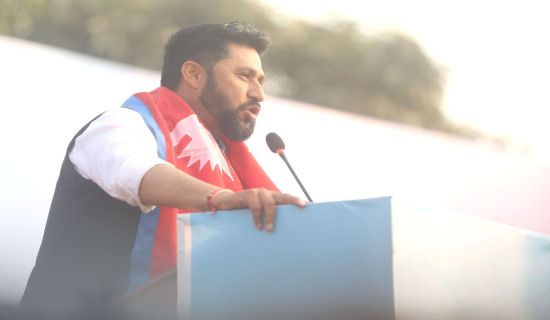- Tuesday, 20 January 2026
The Efficacy To Fight Climate Change
The climate change crisis has presented existential challenges to the human society no matter the states are democracies or authoritarians. Ultimately it rests with political regime at the state level as to how to deal with the challenges although transnational action is equally important. How does political regime address challenges posed by climate change and which type of regime - democratic or dictatorial - is effective to counter the menace of the rapid climate deterioration? These issues have been a matter of political economy scholarship and climate experts at least in the western developed world. It is found that accelerating climate crisis is already occurring in parallel with escalating democratic breakdown and recession in the world.
Almost half the world's population lives in a democracy, but few of these are counted according to Freedom House indices as full democracies. Many are sliding into some form of hybrid authoritarianism rather than becoming places that do have unencumbered form of democratic representative government. Public-opinion polls register widespread dissatisfaction with how democracy is working today. There is a deepening concern that democratic channels of deliberation and legislation are not up to the task of governance. As the atmosphere heats up and democracies falter, will masses of people clamour for "eco-authoritarian" leaders to provide a pathway to climate safety?
Zero-emissions economy
Will expanded emergency powers, concentrated decision making authority enable state agencies to adopt sweeping climate policies, effectively dismantling fossil capitalism and constructing a zero-emissions economy in its place? The answer to this question is said to be in negative due to various reasons. The notion that the climate crisis requires swift, authoritarian and non-deliberative decision-making and collectively mobilise the population towards a shared, and existential goal looks alluring. But Nomi Lazar and Jeremy Wallace in their article titled "Resisting Authoritarian Temptation", published in the widely read Journal of Democracy, recently counter the rather hollow logic of this eco-authoritarian temptation.
Despite the appeal of populist-cum-authoritarian projects that pit the people, and their shared interest in climate stabilization against a coterie of authoritarian elite, the authors duo assert that there is no bright line between democratic and authoritarian type of regime. While not denying the formidable economic and political power of fossil elites, Lazar and Wallace point out that the reality is more complex. But even if an authoritarian leader could rise to power on the promise to build a "big green state," there are additional reasons to question an antidemocratic solution to global warming. According to Lazar and Wallace, this is because democracy offers three key resources to manage complex crises such as climate change that include dynamic information flows, vertical accountability, and a multiplex political temporality.
Lazar and Wallace argue that we ought to be suspicious of authoritarian actions like declarations of climate emergency. These are, after all, a common authoritarian tactic. First, when a sense of urgency about the climate confronts the complexities of politics, it becomes easy to blame democratic intransigence. Would not a government less encumbered by the demands of discussion and consent get the climate job done faster? This narrative identifies the problem as the lack of unitary, focused power capable of evading democratic checks and balances. No good evidence suggests that regimes with authoritarian characteristics are better at climate response. It would be at our common peril to neglect the importance of constitutional democracies as managers of political temporality. Democracies facilitate politics as a continuing process. There is always the next election, the next policy round, judicial review and appeal, more time.
Authoritarians aspire to be the ultimate government, the last power, so they barricade themselves by controlling information flows, silencing not only enemies but even supporters. Even where these methods work and secure the regime, they insulate leaders from feedback that is critical in both senses. Policies are adopted in ignorance and without sufficient scrutiny, and they fail. Where these scrutiny measures do not work, we find a negative spiral of competing claims of legitimacy. Political contestation over climate policy will not stop with the achievement of concentrated power. It will just grow violent. Any politics of authoritarian tilt is ultimately a politics of illegitimacy.
Since all constitutional democracies have emergency powers, why not use these to confront climate change, while keeping democracy on the simmer. Using formal constitutional or statutory emergency powers would add needed firepower to the executive, in this view, and would do so without risking full-scale authoritarian rule. Those who seek emergency action through a recourse to climate authoritarianism, whether in the short or long term, must justify the shift to emergency powers by claiming a reasonable expectation that the shift might prove effective, stress Lazar and Wallace.
Energy policy
To establish reasonableness, we would need evidence that, for instance, the complexities of energy production, distribution, and use can be managed by means of emergency powers with a degree of effectiveness that cannot be obtained using ordinary governmental powers. Furthermore, because climate is global, any solutions could well depend on the whole world pulling in the same direction together. To beat climate change, energy policy must shift broadly. Moreover, no single state's resort to authoritarian climate governance could be justified on grounds of necessity unless all states took this route.
It is important to emphasise not only that the charges against democracy have been overstated, but that democracy brings unique and substantial resources which will be critical to climate-change mitigation and adaptation. Finally, one of democracy's central benefits is that public criticism and free and fair elections give leaders potent, immediate incentives to learn from failures. Democracies far exceed authoritarian regimes at spreading accurate information to decision makers. And democratic institutions are flexible enough to change course as circumstances shift. In the climate age, we must defend democracy so that democracy can live to defend us.
(The author is presently associated with Policy Research Institute (PRI) as a senior research fellow. rijalmukti@gmail.com)















